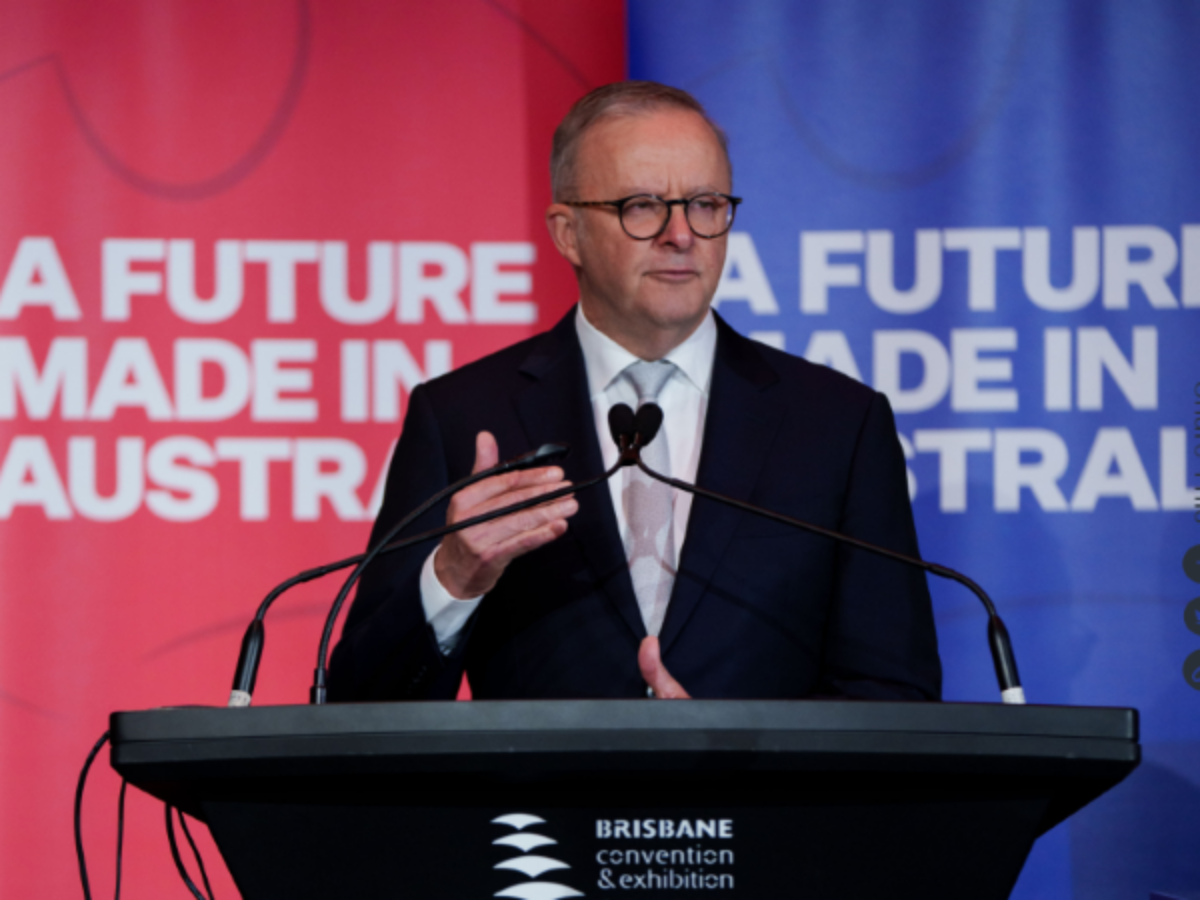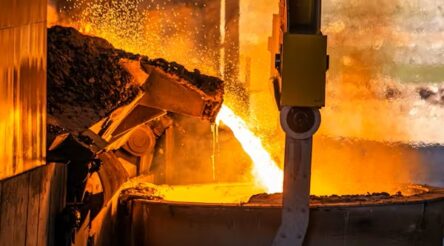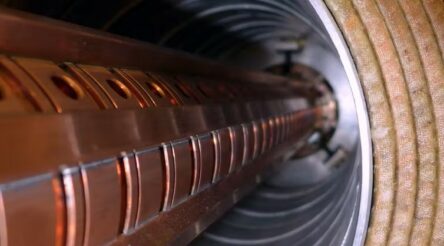A Future Made in Australia – Anthony Albanese in his own words

On Thursday in a speech in Brisbane Prime Minister Anthony Albanese revealed he would put to Parliament a bill for a Future Made in Australia Act which would respond to increasing global competition through more activist industry policy. Here is an edited transcript of his speech.
We need to be clear-eyed about the economic realities of this decade.
Recognising that the game has changed – and the role of Government needs to evolve.
Government needs to be more strategic, more sophisticated and a more constructive contributor.
We need sharper elbows when it comes to marking out our national interest.
And we need to be willing to break with old orthodoxies and pull new levers to advance the national interest.
We have to think differently about what Government can – and must – do to work alongside the private sector to grow the economy.
To boost productivity, improve competition and secure our future prosperity.
Combining market tools, with government action – to create wealth and create opportunity.
We need to take a fresh look at how government can support small business and start-ups and service industries to diversify our economy and our trade.
Not just playing to our traditional strengths with our traditional partners, but offering new products and services to new markets.
We need this change in thinking and approach, because the global economic circumstances are changing in ways far more profound than the consequences of the pandemic or conflict alone.
This decade marks a fundamental shift in the way nations are structuring their economies.
A change every bit as significant as the industrial revolution or the information revolution – and more rapid and wide-ranging than both.
Domestic economic policy settings are being re-shaped by a new set of global economic imperatives.
And domestic economic priorities are re-shaping trade policy.
In the years following the Cold War, people spoke about ‘the end of history’.
The benign assumption that free trade would spread unchallenged and globalisation would guarantee peace and prosperity for all.
Yet even in countries like Australia that have benefited enormously from the opening-up of our economy and engaging in our region, opportunity has not been shared evenly.
In other parts of the world, the fault lines are far wider.
Strategic competition is a fact of life.
Nations are drawing an explicit link between economic security and national security.
The so-called ‘Washington consensus’ has fractured – and Washington itself is pursuing a new direction.
The United States has implemented the Inflation Reduction Act and CHIPS Acts and pursued what they call a ‘small yard, high fence’ approach to critical industries.
The European Union has introduced its European Economic Security Strategy.
Japan has the Economic Security Promotion Act.
The Republic of Korea is re-framing its economic policy around a National Security Strategy.
And Canada has brought in new rules to tighten foreign direct investment in their significant critical mineral reserves.
All these countries are investing in their industrial base, their manufacturing capability and their economic sovereignty.
This is not old-fashioned protectionism or isolationism – it is the new competition.
These nations are not withdrawing from global trade or walking away from world markets or the rules based order..and let me be clear, nor should Australia.
27 per cent of our economic output depends on trade, and so do 1 in 4 Australian jobs.
We will continue to champion global markets and free trade, to build bilateral and multilateral co-operation and forge agreements.
Equally, we must recognise that the partners we seek are moving to the beat of a new economic reality.
In their different ways, they are re-aligning their economies to better drive and distribute growth across their own populations.
Re-building the social licence for economic reform, through better job security and higher wages.
They are preparing their businesses and workforces to adapt to digital technology…to grasp the opportunities of artificial intelligence and also safeguard against its risks.
They are investing in more clean energy, producing more clean energy and exporting more clean energy.
And they are upgrading their ports, roads, rail, broadband and energy grids.
Of course, not every element of every other nation’s approach will be right for us.
But we must recognise there is a new and widespread willingness to make economic interventions on the basis of national interest and national sovereignty.
And – critically – none of this is being left solely to market forces or trusted to the invisible hand. The heavy lifting of economic transition and industrial transformation is not being done by individuals, companies or communities on their own.
It is being facilitated, enabled and empowered by national Governments from every point on the political spectrum.
Because this is not about ideology, it’s about opportunity – and it’s about urgency.
Securing jobs, attracting investment and building prosperity has never been a polite and gentle process where every nation gets a turn – it’s always a contest, it’s always a race.
Governed by rules, driven by competition.
And Australia can’t afford to sit on the sidelines.
Being in the race does not guarantee our success – but sitting it out guarantees failure as the world moves past us.
An inescapable lesson of the past half century is that Australia cannot isolate ourselves from global economic change, even if we wanted to.
Our challenge and our great opportunity lies in anticipating change, shaping it and making sure it delivers for our people.
And doing this in in our own uniquely Australian way.
We are a trading nation, an outward-looking economy, we are engaged in the Indo-Pacific, a leader in our region, a middle power in our own right.
Australia is in this race, no matter what.
Our Government wants Australia to be in it to win it.
We can do this by building on our existing strengths – and also looking beyond them.
In so many important ways, Queensland perfectly captures the unique set of advantages and imperatives Australia has:
Our resources – both in and above the ground – essential to the future of global energy.
Our location – on the doorstep of the fastest growing region of the world in human history.
Our natural environment – a unique treasure and an international drawcard.
Our people – smart, skilled, resilient and adaptable.
And – never to be underestimated – our democracy and our society.
A social safety net that empowers people, a world-leading superannuation system, remarkable universities and TAFEs…
…and a multicultural society that gives us a family connection to every nation in the world.
We can make this a winning combination – but only if we work at it.
By adding value to our resources here.
By turbo-charging our engagement with our region – diversifying our exports, deepening our ties and building new markets for our expertise and our services as well as our products.
By investing in our people – education and skills but also the housing and infrastructure and quality, affordable care that boosts productivity and quality of life.
By protecting our environment – for tourism, for farming and for future generations.
And strengthening our society – delivering the services and care that nourish aspiration and help people lead better lives.
These established strengths are essential – but they are not enough.
Drawing only on what we already have, guarantees a diminishing return.
The wasted decade of our predecessors is proof of that.
Australia cannot afford another ten years running on the fumes of past economic reforms.
We cannot afford another decade where government is a drag on business investment and productivity instead of a driver of it.
A decade where businesses investing in the future – from embracing renewable energy to promoting gender equality – were acting in spite of government, not in concert with it.
We know the high price of the last decade: low productivity growth, low business investment and a narrowing of our economic foundations.
As the Treasurer, Jim Chalmers, has put it – Australia’s economy is not productive enough, not resilient enough and not competitive enough.
We need a new wave of economic reform to change this.
To drive growth, improve competition, lift productivity and create the next generation of prosperity and opportunity.
This new wave demands a new approach – and since the last election, our Government has been laying the foundations to deliver it.:
- Embracing clean energy
- Securing a landmark National Skills agreement
- Creating the National Reconstruction Fund
- And establishing the Net Zero Economy Authority.
Putting Science together with Industry under Ed Husic, to make sure we commercialise the opportunities arising from Australian innovation.
In next month’s Budget – and beyond – we’ll be building on that foundation.
In this time of transformative opportunity, our Government will not be an observer or a spectator – we will be a participant, a partner, an investor and enabler.
We will be guided by three principles.
First, we need to act and invest at scale.
Moving beyond a ‘hope for the best’ approach where the priority has been minimising government risk, rather than seeking to maximise national reward.
Second, we need to be more assertive in capitalising on our comparative advantages and building sovereign capability in areas of national interest.
For too long, Governments have taken a reactive, patchwork approach which has been more about managing an immediate crisis rather than maximising long term opportunity.
Our Government will be proactive when it comes to backing Australia’s comparative advantages and delivering on our national interests.
The investment we’ve made through our SunShot solar manufacturing program is proof of that, as is our Hydrogen Headstart program and our Critical Minerals Facility.
Thirdly, we will continue to strengthen and invest in the foundations of economic success:
- Affordable and reliable clean energy
- A better and fairer education system
- Skilled workers, secure jobs, fair wages
- Modern infrastructure
- Shared ambition with business and private capital
- And a positive regulatory environment.
We recognise that for Australians to fully share in the rewards, Government needs to be prepared to use its size and strength and strategic capacity to absorb some of the risk.
Only Government has the resources to do that.
Only Government can draw together the threads from across the economy and around our nation.
To anchor this reform and secure this growth, today I announce that this year our Government will create the Future Made in Australia Act.
We will bring together in a comprehensive and co-ordinated way a whole package of new and existing initiatives.
To boost investment, create jobs and seize the opportunities of a future made in Australia.
We want to look at every measure that will make a positive difference.
Investing in new industries – and ensuring that workers and communities will share in the dividend.
That means giving the new Net Zero Economy Authority every tool it needs to support resource communities in particular through the coming period of economic change. Town by town, worker by worker.
This isn’t something that happens overnight, it’s the work of a generation. But the preparation for what comes next, has to start now.
This means looking at how government procurement can support small business and local manufacturing, as well as sustainability and the circular economy.
Putting together the most efficient and effective combination of financing facilities and investor incentives to drive new economic growth.
Securing greater sovereignty over our resources and critical minerals.
Driving competition reform, to deliver a better deal for Australian consumers, Australian farmers and producers and Australian workers.
Delivering better and broader community benefit from renewable energy projects and fast-tracking the infrastructure that supports them.
Maximising the strategic value of our government investment funds – and our national superannuation system.
And opening the doors of opportunity, by giving more Australians in our regions and suburbs the chance to get a TAFE qualification or a university degree.
That’s just some of the reform agenda we will be outlining this year.
We are open to all good ideas – from business, from industry, from unions, from state and local government and from across the Parliament.
This won’t be a one-off. It’s about building an enduring framework that can adapt over time.
Obviously, Australia cannot go dollar for dollar with the United States’ Inflation Reduction Act.
But this is not an auction – it’s a competition.
And Australian can absolutely compete for international investment when it comes to our capacity to produce outcomes, the quality of our policies and the power of our incentives.
As the Treasurer has said, part of the objective here is about Australia presenting potential investors with ‘a single front door’.
A clear path to investing in Australia, in Queensland, in hydrogen, green metals and advanced manufacturing.
And the right skills, supply chains and processes to get projects up and going and see this investment realise a return.
Above all, this is about giving Australian businesses, Australian communities and the Australian people every possible opportunity to benefit from this moment.
Such a central part of the story of Queensland is the capacity of people in this big state to do the big things.
Transforming Brisbane to the global city we’re in today.
Transforming Gladstone to an international industrial centre.
Transforming the Gold Coast from a beautiful strip of beach to one of the world’s great tourism destinations.
Safeguarding the extraordinary natural treasures of the Great Barrier Reef and the Daintree.
Building the railways and infrastructure and ports to spread the opportunity of the resources boom across the regions.
Reviving Queensland unis and research centres and TAFEs through the Smart State agenda.
All this speaks for Queenslanders’ capacity to build – but also the creativity to reinvent.
The foresight to turn the dividends flowing from one wave of growth into surfing the opportunities of the next wave.
That’s never been more important – for Queensland and for Australia.
Our Government is investing in manufacturing to make more things here.
We’re building the infrastructure and clean energy to power new growth.
We’re training people in new technologies.
We’re facilitating private sector innovation and catalysing new investment.
We’re building an economy with more secure work and fairer wages.
That’s what I mean by a future made in Australia.
A future where we compete and win for the great prize of new prosperity.
And win our way – by staying true to the values that make this the greatest country on earth.
Fairness at work, equality in society, compassion and dignity in our social safety net and an unshakeable belief in opportunity for all.
Reform that holds no-one back, progress that leaves no-one behind.
A stronger, fairer and more prosperous future – made right here in Australia.
Further reading:
Albanese flags government intervention to back industry
Picture: Anthony Albanese
@aumanufacturing Sections
Analysis and Commentary Awards casino reviews Defence Gambling Manufacturing News Online Casino Podcast Technology Videos





